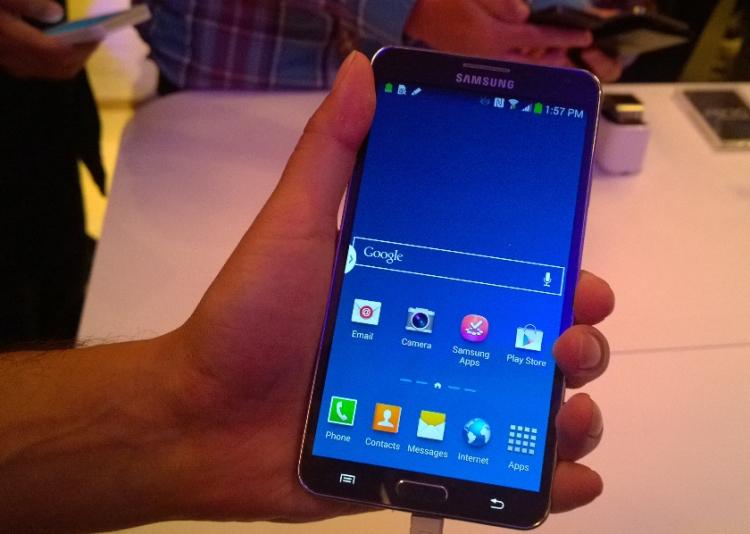
The Samsung Galaxy Note 3 was only recently released, and as expected the phone is just blazing fast. With a 2.3GHz Snapdragon 800 processor under the hood, you wouldn't expect anything less of it, but that doesn't mean your curiosity won't get the better of you to check the benchmarks just to see how well this shiny new device can hold up against the competition - you want to know just how bad this bad boy is, right? If you decide to do a benchmark test on the new Samsung Galaxy Note 3, you'll probably find yourself quite pleased at how it compares to other devices. The reporters over at Ars Technica were, anyway, and here's why.
The Galaxy Note 3 uses the same 2.3 GHz Snapdragon 800 processor as the LG G2 does, so you would think that the two would be on par with each other, or at least extremely similar in comparison. Mysteriously, the Galaxy Note 3 fares way better than the G2 does on just about any benchmark test. Why? Because allegedly, Samsung decided to tweak the Note 3 to go into some super power mode that makes all four cores run at 2.3 GHz during a benchmark test, and only during a benchmark test, while under normal use the device doesn't use all four cores. As a result, the Galaxy Note 3 looked to run about 20% faster than it would under most normal use in benchmark tests. So, in a nutshell, Samsung is cheating in order to raise their benchmark scores to score some points with people like you and me who care about that kind of stuff.

I can admit that after reading the article my blood got to boiling, just a little bit. Why would a company like Samsung need to cover up the truth about the Note 3, which isn't even bad to begin with? As long as your device doesn't end up somewhere buried into oblivion near the bottom of a list of comparable devices, I don't really give two hoots about if it's the fastest phone or not. I just kind of want to see how it compares to others. And it makes me a little skeptical of Samsung's practices, especially since this isn't the first time they've been caught cheating on benchmark tests. Tech website AnandTech also covered this same issue with the International Galaxy S4 as well.
In regards to exactly how the Galaxy Note 3 is being boosted, the Ars Technica states that they found a peculiar looking file:
"The file we ended up with is called "DVFSHelper.java," and it contains a hard-coded list of every package that is affected by the special CPU boosting mode. According to this file, the function is used exclusively for benchmarks, and it seems to cover all the popular ones."
Sketchy.
So here I am thinking to myself, why did Samsung pull this number again? Did they think nobody would figure them out? Then I realized that it really doesn't matter. At the end of the day, it's still a popular device made by Samsung, and the issue at hand isn't big enough for most people who planned to pick up the device to care. Is it an issue that should be addressed? In my opinion it is, because I see it as blatant cheating. It's nice to know that the phone can run at that performance, but if the device isn't going to be performing that well on a consistent basis (if ever) then it's really not giving me the information that I wanted to know. It's just a ploy to try and make the device look good, which might have worked if people who don't specifically look for this kind of thing was reviewing the device. But most general consumers don't really care about benchmarks; if a phone is fast it's fast, if it's slow it's slow. Benchmarks are too technical for anybody outside of this industry to really give two flips about.
Realistically, if a device isn't at the top of the benchmark list isn't going to sway my decision one way or another; as I said, I primarily check benchmarks just to see how it compares to other devices. That being said, the Galaxy Note 3 is still a super fast device and had nothing to worry about in the first place; it still scored better than the G2 without the 20% booster. Yet, I can't help but feel somewhat disappointed that Samsung felt they had to bend the rules a little too far in their favor just to try and look like that much of an overachiever. It's being deceitful for no good reason at all.
In all likelihood, this isn't going to stop anytime soon. Does this type of thing really, truly adversely affect Samsung's cashflow in the end? Hardly. Most people are still going to buy those phones like hotcakes. We vote with our wallets, and the truth of the matter is that the general consumer still won't care about being lied to about benchmark scores. Personally, I don't like being lied to, so my wallet is going to vote "No" for Samsung until they can play nicely with others.
Readers, what are your thoughts? Is the benchmark boost worthy of being made an issue of? On the other hand, would you rather a benchmark tell you just how powerful a device can be rather than scoring it appropriately for normal everyday use? Let us know your thoughts on the matter in the comments below!
Image via Ars Technica